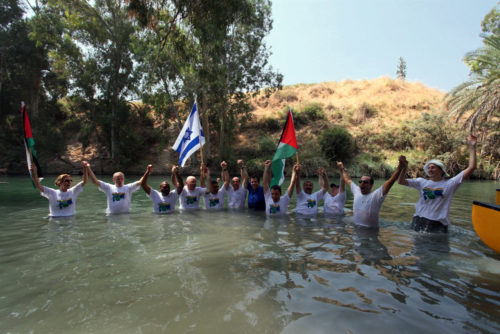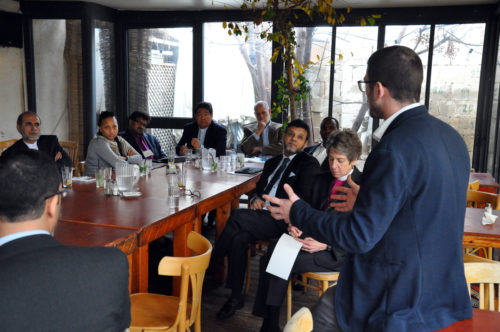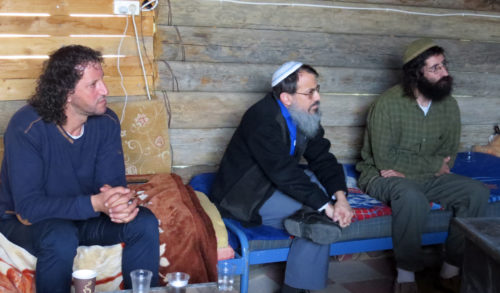Holy Land groups pave path to peace with commonality and trustPosted Mar 18, 2015 |
|
[Episcopal News Service] It may be a cliché to say that water knows no boundaries, but for Elizabeth Koch-Ya’ari, navigating the stream of ecology and peacemaking is bringing together Israeli, Palestinian and Jordanian environmentalists – people of different faiths from neighboring communities – to mobilize and build friendships around their common source of life.
As a project coordinator with EcoPeace Middle East, Koch-Ya’ari leads a campaign to rehabilitate the Jordan River. Once a vital source of clean water throughout the Holy Land, the river has been sullied by untreated sewage and drought during the past 50 years.

EcoPeace Middle East gathers Israelis, Jordanians and Palestinians in the lower Jordan River for the “Big Jump,” an event to raise awareness of river restoration efforts. Photo: EcoPeace Middle East
“We come together and we use environment as a platform for peace-building,” Koch-Ya’ari told Episcopal News Service following a presentation in Tel Aviv in January, when she met with a United States interfaith delegation that visited the region on pilgrimage.
“It’s an amazing opportunity to enter into understanding these different communities that are bordering each other, that share the same water resources, that share the environment,” she said. “In this area of the world, water can bring us together, because water does not see all these walls and borders that we put between each other.”
The Jordan River has major significance in Judaism, Christianity and Islam as the site where the Israelites crossed into the Promised Land, where John the Baptist baptized Jesus, and where Prophet Mohammed foretold an event that happened years later.
EcoPeace has created a toolkit of resources for Jewish, Christian and Muslim communities, called Water and Ecology in the Jordan River, to encourage faith-based education and engagement around the issue of water.
“The reality is that many people who live along the Jordan River don’t experience its benefits. In many parts of its flow, it’s dirty, polluted, [and] it disappears in dry seasons of the year,” Episcopal Church Presiding Bishop Katharine Jefferts Schori, one of the pilgrimage co-leaders, told ENS while visiting the Yardenit Baptismal Site along the Jordan River in the Galilee region of northern Israel.
“The work of the EcoPeace institute is to gather people from both sides of the river, from different faith traditions in neighboring communities, to advocate and work for improvement of the water situation, to understand each other’s needs, and they come to understand each other as friends in doing that work,” she said. “It’s true peace-building work.”
The Rev. John Kitagawa, rector of St. Philip’s in-the-Hills Episcopal Church in Tucson, Arizona, and a pilgrimage member, said the disappearance of the Jordan River would be tragic. Not only does it mean so much to the lives of people on both sides of the Jordan River, he said, but “it is deeply important to our faith. It’s not possible to read the Scriptures without all kinds of references to the Jordan River.”
Kitagawa said there are lots of parallels in the United States where water issues abound.
“I live in the desert in southern Arizona. Our groundwater is basically depleted. We have to import water from the Colorado River, and so the very substance of life is at stake,” he said. “But it’s not just those of us who are desert-dwellers. We are increasingly seeing people who are dealing with fracking issues in their area and how that affects groundwater. Coal mining and other forms of mining have deep issues with polluting water and farmers are increasingly facing drought issues with global warming. Water is a constant issue around us. We have very much in common, and we just need to figure out how to understand our common roots, and one of those common roots is our responsibility as stewards of God’s creation.”
“Communities across this region share so much,” Koch-Ya’ari said of the Holy Land. “Water is a basic part of life and to join together to rehabilitate shared water streams like the lower Jordan River, we gain a lot, not only for the environment but also to learn about each other, about our different faith communities and about how we can help each other [and] our shared ecosystems.”
Koch-Ya’ari is one of a number of leaders of grassroots initiatives in the Holy Land with whom the U.S. interfaith delegation met during its Jan. 18-27 pilgrimage.
She and other grassroots leaders are certain that these sorts of initiatives will be the key to building the trust and breaking down the barriers that will ensure a lasting peace in the region long after the politicians broker any kind of deal. However, prospects for the resumption of negotiations between Israelis and Palestinians appear complicated at best after a year that has seen the collapse of peace talks brokered by U.S. Secretary of State John Kerry, a devastating war between Israel and the Palestinian movement Hamas in the Gaza Strip, and a series of actions and statements by Israeli and Palestinian leaders that both reflect and contribute to a divisive climate.
Israeli Prime Minister Benjamin Netanyahu, whose Likud Party emerged as the winner of Tuesday’s parliamentary elections, provided the latest example of politically charged rhetoric this week, stating the day before the election that there would be no Palestinian state under his leadership. Netanyahu previously has consistently endorsed a two-state solution, including in the context of negotiations with the Palestinians. It is unclear what the prime minister’s statement this week, in the context of a divisive and surprisingly close election, might mean for the future of the peace process or Netanyahu’s own relationship with key international supporters of a two-state solution, including the United States government.

Lior Frankiensztajn of the Shades Negotiation Program talks to members of the U.S. interfaith pilgrimage that visited the Holy Land in January. Photo: Matthew Davies/ENS
Back in January, the interfaith group heard how Lior Frankiensztajn’s world changed a few years ago after he welcomed a Palestinian man into his home for two months. He got to learn many things about himself and his roots, but most importantly, he saw “how reality looks from a different perspective,” he told the interfaith pilgrims following lunch in a Tel Aviv restaurant. Unfortunately, “politicians manage the relationships, which limits the opportunity for progress. … There has to be a different approach to policymaking, to education.”
It was this thinking that led Frankiensztajn to launch the Shades Negotiation Program, which creates opportunities for Palestinian and Israeli decision-makers, politicians, educators and other leaders to meet and engage with their counterparts. The program is sponsored by Harvard University and partly funded by the U.S. State Department.
Acknowledging that it is easy to engage the converted, Frankiensztajn said that Shades is trying to identify the obstacles, areas that need more attention in helping people “to become better negotiators, better communicators through this experience [and] really getting to understand the nuances and the culture of the other side.” Creating trust, he added, is a critical part of the peace process.
Azhar Azeez, president of the Islamic Society of North America and a pilgrimage member, responded to Frankiensztajn’s presentation with encouragement and congratulations for his peace-making efforts. “I can see how this endeavor will bring positive change and hope,” he said.
The 15-member interfaith pilgrimage was co-led by Jefferts Schori; Rabbi Steve Gutow, president of the Jewish Council for Public Affairs; and Sayyid Syeed, national director of interfaith and community alliances for the Islamic Society of North America.
The visit was planned in response to Resolution B019, passed by The Episcopal Church’s General Convention in 2012, that called for positive investment and engagement in the region and recommended that the presiding bishop develop an interfaith model pilgrimage with multiple narratives. That resolution reiterated The Episcopal Church’s longstanding commitment to a negotiated two-state solution “in which a secure and universally recognized state of Israel lives alongside a free, viable and secure state for the Palestinian people.”
“Only when people on the ground speak up and say ‘enough is enough’ will the possibility of peace and justice break through in the problematic relationship between the Palestinians and Israelis,” said Gutow. “When we meet with groups like Shades, Roots, and EcoPeace, we know that the journey to resolution and reconciliation is not only possible but eminently doable.”

Episcopal Church Presiding Bishop Katharine Jefferts Schori and Rabbi Hanan Schlesinger greet one another as members of the interfaith pilgrimage arrive at Gush Etzion to learn about the work of Roots. Photo: Matthew Davies/ENS
The group Roots brings together Israeli settlers in Gush Etzion with Palestinians from adjoining villages to promote dialogue and build trust as a path to peace. The leadership of Roots believe it is imperative for the communities to put aside political retrenchment, divisive actions and rhetoric in order to begin sowing the seeds necessary to make an eventual peace agreement take hold.
Rabbi Hanan Schlesinger told the interfaith leaders that Roots has transformed the way he views the world.
One year ago, at the invitation of a friend, Schlesinger left his home and walked just 20 minutes through the Arab fields and vineyards and arrived at the piece of land where the interfaith pilgrims were now gathered to listen to his story. He said his heart was pounding as he entered the compound where approximately 25 Jews and 25 Palestinians were talking.
Schlesinger, now a Roots project coordinator, had grown up with fear of the Palestinians who lived alongside his village.
“We have no connections with the other side. Newspapers are different, radio stations are different, houses of worship are different, we buy in different stores, we have different school systems. We have no contact at all. We pass one another on the roads and don’t know who’s driving the car,” he said. “When you have that situation of distance, you have fear and you have suspicion and you have hate.”
But through the conversations he had during that gathering one year ago, he came to understand that the Palestinians who’d been his neighbors all those years also lived in fear of him. “I’ve never thought of it like that before. We’re afraid of each other,” he said. For the first time in his life, Schlesinger said, he was talking to “the other” as an equal.

From left, Roots project coordinators Ali Abu Awwad, Rabbi Hanan Schlesinger and Shaul Judelman listen to responses from members of the U.S. interfaith pilgrimage who visited Gush Etzion in January. Photo: Matthew Davies/ENS
Palestinian Ali Abu Awwad, a co-founder of Roots, was at that gathering and shared his life story with the group. “It was the first time in my life that I heard life from a Palestinian perspective, and he spoke without rancor, without hate, and we spoke about his life,” Schlesinger said. “It was really difficult to hear and it felt like I was being personally attacked to hear a narrative that is so different from mine. But as different as it was from my narrative, it wasn’t false. I didn’t hear any lies. I heard that he was taking the building blocks of history and of life as I know them and putting them together into a completely different story, but his story made sense. And now I see myself in Ali’s story. And although he didn’t say it, in his story I saw myself as the oppressor. It began a process of rethinking.”
Awwad, who was raised in a highly political family and served time as a political prisoner, said there are many conflict designers on both sides and that “we are good in this competition of who suffers more. … But when it comes to solutions, we lose the courage, because we act like victims. Victims will never be able to solve their own conflict if they are the prisoners of their pain. … The price of this war has become easier than the price of peace. We need to find a way where people can serve God and not lose their humanity. We can make a difference together.”
Shaul Judelman, a Roots project coordinator who has lived in Gush Etzion for the past 13 years, said: “We know that there is great disagreement over many issues – over the facts of the past and even about the reality of the present – but we believe that effective dialogue is the secure place for argument and deeper understanding. It is in this space that solutions can be built.”
Gutow said that Roots “teaches us … about traditional politicians oppressing the intrinsic dreams of the real people who live on the land.
“We must stand with those who can both understand and speak with integrity about the differing narratives of the regular people who make their homes there,” Gutow added. “We must provide them with the platforms and the financial support and the validation they need to succeed. The job of our pilgrimage is to serve as an interfaith witness to the truths of both sides and to help the good and kind people who dwell there find the peace and wholeness and calm they so desire and so deserve.”
Reflecting on the pilgrimage, Jefferts Schori told Episcopal News Service that “the kinds of grassroots peace-making efforts we witnessed in the Land of the Holy One are all focused on building relationships. [Yet] the sad reality is that Palestinians and Israelis live almost completely separate lives. Most never meet at grocery stores, schools, or in civic life. … That human encounter is essential to humanizing ‘the other.’ The Abrahamic faith traditions speak of encountering the image of God, the divine creative capacity that is part of our nature.”
She said she was encouraged by “the willingness to cross boundaries, physical divisions, as well as suspicion, doubt, and fear” and described it as “the soil in which peace can begin to grow, … Getting one’s hands dirty together creates bonds that are deeper than our conscious prejudices. Bonds born of shared labor will endure, and they invite others to come and see, to be a bit vulnerable, in order to see the healing that might be possible.”
— Matthew Davies is an editor/reporter for the Episcopal News Service.

Social Menu